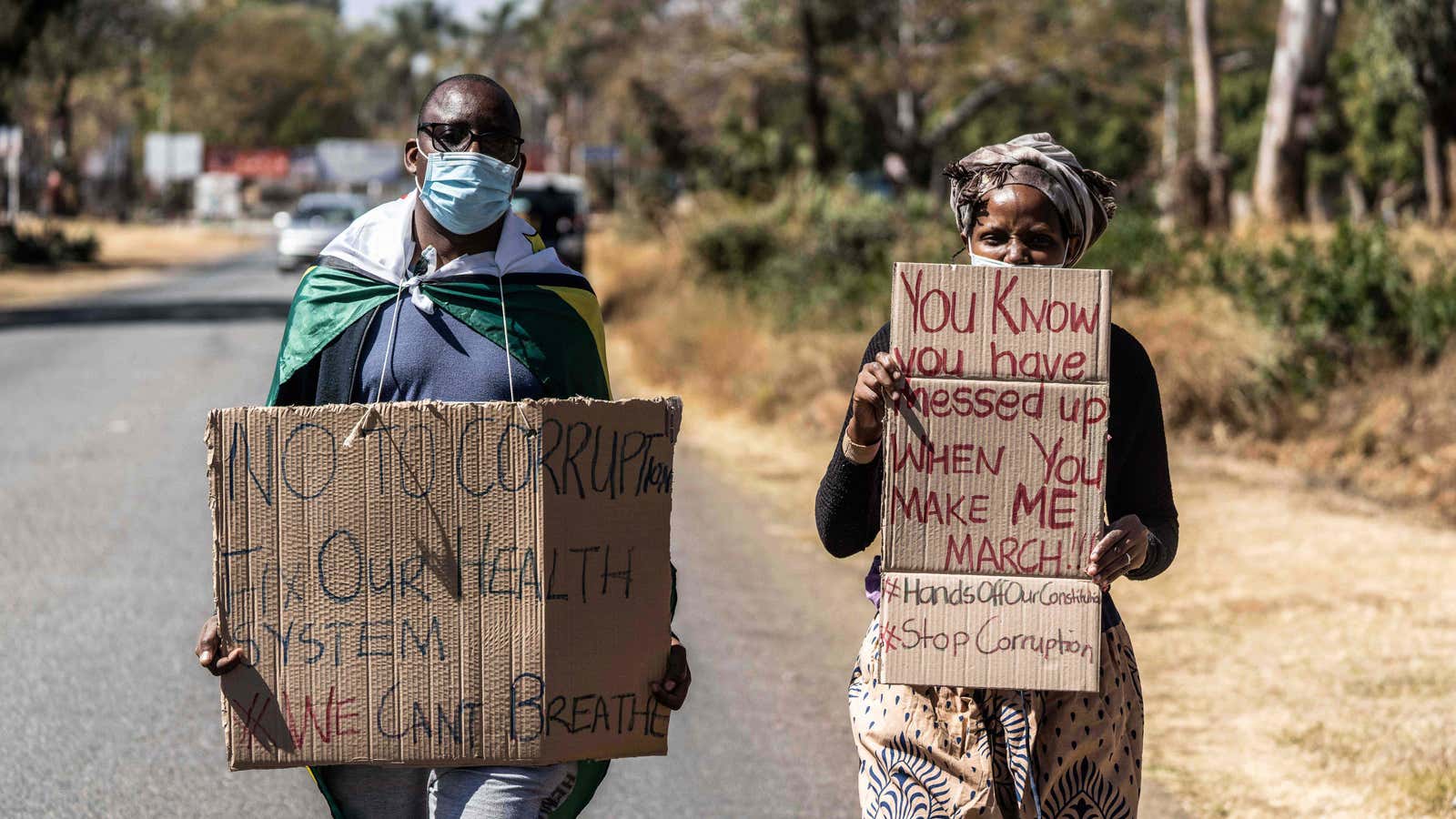It’s been one year since George Floyd died at the hands of Minneapolis police officer Derek Chauvin, sparking a series of online and offline protests in the US, and globally, against police brutality and racism. The moment gave further impetus to BlackLivesMatter, a Twitter hashtag-turned movement which was born in 2013 after the shooting of Trayvon Martin, an unarmed Black teenager in Florida.
Floyd’s dying words—“I can’t breathe”—reverberated around the world.
They traveled as far as Zimbabwe, inspiring citizens last August who were campaigning against a widespread and brutal crackdown by state security agents on opposition party members and activists, against the backdrop of the coronavirus pandemic.
The campaign went online, under the banner #ZimbabweLivesMatter, and was picked up by world leaders, celebrities and politicians.
This success has galvanized the country’s social activists, who have increasingly taken to social media to push for reform. In February, vice president Kembo Mohadi resigned in the face of growing social media pressure after online site Zimlive published allegations that he had sexually abused several women, some of whom were state security agents assigned to his office.
Media Institute of Southern Africa-Zimbabwe director Tabani Moyo believes the online space is pushing human rights forward in the US as well as sub-Saharan Africa, by allowing a multiplicity of communities to interact online with minimum restrictions.
“It has energized both black and white people on the need for structural reforms which now form the bedrock of the Biden administration,” Moyo said. “For Zimbabwe the dividend is on the intersection of online activism and offline action.” But, he cautioned, the momentum needs to be sustained or risk fading away.
Forcing activists online
Under the guise of measures to curb the spread of Covid-19, president Emmerson Mnangagwa last year tightened Zimbabwe’s lockdown regulations. This thwarted protests against rampant corruption planned by the opposition party, Transform Zimbabwe, for July 31.
Amnesty International alleges that these protests, and the pandemic, prompted the government to terrorize its critics, opposition leaders and activists, and their family members. This culminated in the torture of media student Tawanda Muchehiwa, who is believed to have been abducted by a joint team of police and military agents.
As people could not go to the streets to express their grievances, they turned to social media through Twitter hashtags and petitions. They were inspired by the change they were seeing in the US at the time, where protests against racial injustice were spilling out from social media into the streets.
Pictures of the gross human rights violations were circulated on social media. The hashtag, ZimbabweLivesMatter, was picked up by South African celebrities like singer AKA and actress Pearl Thusi, as well as British actress Thandiwe Newton and American actor and filmmaker Ice Cube.
Former Botswana president Ian Khama weighed in to support the Twitter hashtag movement.
“During Ian Smith’s white minority rule in Rhodesia, the police used to clamp down and oppress the black majority. A successful war of liberation was waged to free that majority from oppression and gain independence,” Khama wrote on his Facebook page at the time referring to a picture showing Zimbabwean police officers beating citizens.
“Now forty years later and under majority rule, nothing seems to have changed for the long suffering people of Zimbabwe other than the name of the country and that of its leaders. Free Zimbabwe! #ZimbabweanLivesMatter.”
This growing social media revolution put the actions of Mnangwana and his government in the spotlight, resulting in South African president Cyril Ramaphosa sending a delegation to try to help resolve the crisis in August 2020.
The government fought back, saying that the pictures being circulated on social media were old, or photoshopped. These allegations were dismissed by Zimfact, a non-partisan Zimbabwean online fact-checking platform.
Online limitations
In the US, the #BlackLivesMatter movement raised massive awareness around police brutality and racial injustice, resulting in the government and corporations eventually enacting significant reforms. On April 20, Chauvin was convicted on two counts of murder and one count of manslaughter.
Meanwhile, the Zimbabwe state security agents who were accused of gross human rights violations last year are walking freely.
Moyo says that online activism cannot be effective if it’s unable to intersect with offline campaigns. He cites #FeesMustFall, a 2015 student-led protest movement in neighboring South Africa that pushed for free education, and increased government funding of universities. Its online campaigns, combined with its mass in-person protests, produced notable changes in South Africa’s tertiary education system.
“#FeesMustFall…was a strong movement online but offline you could see the protests taking shape in different formats,” Moyo says.
Zimbabwe has seen vibrant online campaigns against the government before. From 2016 to 2017, the #ThisFlag movement protested against the regime of Robert Mugabe, Zimbabwe’s long-time ruler who was later ousted in a military coup.
The online campaign was one of Zimbabwe’s most impressive anti-government mobilizations in recent times. At one point it encouraged people to stay at home, forcing many businesses to close, and leading to Harare temporarily shutting down, according to the Institute for Security Studies (ISS), an African non-profit organization that provides analysis of conflict and governance.
People still cite the Twitter hashtag ZimbabweLivesMatter, as the government continues to make it difficult for people to protest in the streets, citing restrictions to curb the spread of Covid-19.
But for the slogan to continue to have an effect, it will need to find a way to effect real-life change despite these restrictions.
“In progressive societies, hashtag movements are effective in terms of action and consensus mobilization,” Dr. Admire Mare, a senior communications lecturer at the Namibia University of Science and Technology says. “However, for these movements to be effective in repressive regimes, they need to tap into elite consensus erosion, and widespread indignation, against the ruling elite. Otherwise they may end up becoming slacktivist campaigns with no tangible results.”
Sign up to the Quartz Africa Weekly Brief here for news and analysis on African business, tech, and innovation in your inbox.
